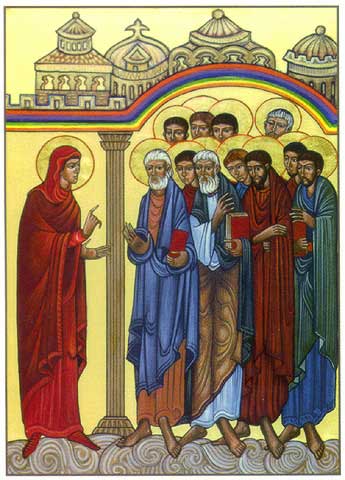I think every family has silly sayings which seem perfectly normal to those on the inside but a bit odd to the rest of the world. In our family, one of those is "When Dad's queen..." because Dad often has better ideas about how to run the country than those who do, and plans to implement them as queen. As a heads up if you're interested, when Dad does gain the crown children won't go to school till they're 7, and all bananas will be sold with names on them according to how many there are in the bunch, such as Paul, John, George and Ringo on bananas sold in bunches of four.
 I prefer to play "when I'm Archbishop", or in my humbler moments, "when I'm vicar". My latest round of this was inspired by the book I'm reading, which I may or may not have raved to you about already, "A Year of Biblical Womanhood" by Rachel Held Evans. She was noting the privileged role given to Mary Magdalene as the first witness to the resurrection, and how she was the one to announce the news to the apostles despite the fact that as a woman, her testimony would have counted for nothing in that context. She points out that in most churches on Easter Sunday, a man stands up at front and announces "Christ is risen!" but that if we really wanted to do justice to the biblical story, "that distinction would always belong to a woman".
I prefer to play "when I'm Archbishop", or in my humbler moments, "when I'm vicar". My latest round of this was inspired by the book I'm reading, which I may or may not have raved to you about already, "A Year of Biblical Womanhood" by Rachel Held Evans. She was noting the privileged role given to Mary Magdalene as the first witness to the resurrection, and how she was the one to announce the news to the apostles despite the fact that as a woman, her testimony would have counted for nothing in that context. She points out that in most churches on Easter Sunday, a man stands up at front and announces "Christ is risen!" but that if we really wanted to do justice to the biblical story, "that distinction would always belong to a woman".
That got me thinking. That would be a striking way to commemorate Mary and in fact all the women whose faith played such an important role in Jesus' ministry and in spreading the good news of his resurrection. In churches where women are rarely stood at the front, let alone preaching the good news, to have a woman speak those history-shaping words on Easter morning would be both an encouragement to the women in those churches that their ministry is noticed and valued, and a challenge to remember that in trusting this task to a woman, Jesus defied all social and religious expectations about what women were worthy or capable of doing. In the new community of those who follow the risen Christ, there are no social hierarchies, no-one above needing to hear the news and no-one beneath preaching it.
 |
| Mary Magdalene, apostle to the apostles. |
But if I was a vicar, there'd be nothing too striking about a woman standing at the front and announcing that Christ is risen. Fortunately, in a lot of churches no-one would bat an eyelid that it was a woman speaking those words, and that's great - it shows us that those cultural expectations which Jesus began to challenge have continued to be challenged and changed to the extent where it's not so crazy to believe something a woman tells us.
So if I was vicar, how would I commemorate Mary Magdelene on Easter Sunday, how would I demonstrate that destruction of social hierarchy and the invitation for all to come and be part of announcing the good news? I think each Easter, I'd ask someone to take that role who is looked down on or disadvantaged by others in society for any kind of reason, because of class or race or sexual orientation or poverty or disability or age or anything else - we're so good at creating hierarchies and telling people they're not good enough, both inside and outside the church, that it shouldn't be a problem to think of many people who could well represent Mary and take the honour given to her by Jesus. Maybe one year I'd ask the single teenage mum, maybe another year the long term alcoholic. Then the next year I'd ask the child of asylum seekers, and then the next year the great-grandmother with Alzheimers. Another year the trans* woman, and the next year the guy who just came out of prison.
I'd be worried that to ask those people to make the Easter announcement might be insulting or patronising, as if trying to label them as people as the bottom of social hierarchies. But in reality, it's not about creating "us and them" groups but about recognising that none of the many reasons we look down on others and think ourselves above them makes any difference in this post-Easter community. It's about knowing how much we all need to hear the great news that Jesus is alive, and that we're all invited to be part of passing it on. It's about celebrating that news as a whole community, knowing that its not only for the privileged, the wealthy, educated, married, white, Western European men, but for the Mary Magdelenes too. It's for all of us.
No comments:
Post a Comment